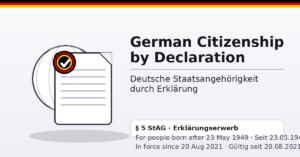Administrative Court of Cologne, September 25, 2018, Case No.: 5 K 2572/18
When foreign nationals requiring a visa wish to visit Germany, they must provide proof that their living expenses during the visit are covered and that no costs will arise for the Federal Republic of Germany. This proof is usually provided through a commitment declaration. In this declaration, a sponsor living in Germany commits to covering all costs incurred during the visitor’s stay in Germany. Living expenses include food, housing, clothing, and other basic needs, as well as care in case of illness and need for long-term care. Responsibility for receiving such a commitment declaration under §§ 66 – 68 of the Residence Act (AufenthG) usually lies with the German immigration authority at the inviter’s place of residence.
Under the legal system, it is up to the sponsor to decide whether and to what extent they will cover the living expenses of a foreigner in Germany, thereby fulfilling the required conditions for their stay. Accordingly, each commitment declaration must be specifically interpreted according to §§ 133, 157 of the German Civil Code (BGB) to determine the purpose and duration of the stay it covers. The authority is responsible for alerting the applicant to possible misconceptions or misinterpretations of the application. If there is an evident misconception by the applicant, the authority must correct it, as an atypical case may exist.
Introduction and Background of the Case
The plaintiff submitted a commitment declaration on August 14, 2014, under § 68 of the Residence Act to the immigration authority to secure the living expenses of a non-related Syrian child, B. This declaration was necessary to allow B. to enter Germany. The commitment was tied to the child’s stay in Germany, including a possible illegal stay. After assessing the plaintiff’s financial capability, the immigration authority gave preliminary approval for the visa issuance. B. entered Germany with his family on December 24, 2014, and later received refugee status and a residence permit under § 25 (2) of the Residence Act.
Legal Basis and Interpretation of the Commitment Declaration
In October 2015, the plaintiff was informed by the Jobcenter that he might not have fulfilled his commitment, as benefits under SGB II had been applied for on behalf of B. The Jobcenter pointed to a possible reimbursement obligation under § 68 of the Residence Act. Later, in January 2018, the Jobcenter demanded €5,232.82 from the plaintiff for benefits paid between July 2015 and December 2017. The plaintiff disputed this claim, leading to the court case.
The court ruled that the plaintiff’s liability under the commitment declaration ended with the issuance of the residence permit on July 30, 2015. Under § 68 paragraph 1 sentence 1, 3 of the Residence Act, the sponsor is liable for a period of five years for public funds used for the foreigner’s living expenses. However, the transitional regulation in § 68a of the Residence Act limits this liability to three years for commitments made before August 6, 2016. In this case, the primary purpose of the stay was fulfilled with the issuance of the residence permit, so the plaintiff’s commitment ended.
Judgment and Legal Evaluation
The court conducted a comprehensive interpretation of the commitment declaration to determine the precise extent of the plaintiff’s liability. The interpretation followed the principles of §§ 133, 157 of the German Civil Code (BGB). It was determined that the commitment declaration in this case was only valid until the residence permit was issued under § 25 (2) of the Residence Act. This meant that the plaintiff’s liability ended with the recognition of refugee status and the subsequent issuance of the residence permit.
Plaintiff’s Argument and Judicial Evaluation
The plaintiff argued that he would not have signed the commitment declaration had he been fully aware of the legal consequences. He emphasized that the immigration authority failed to adequately inform him about the significance and implications of the commitment declaration. Furthermore, the plaintiff noted that the financial burden associated with the commitment would have been unreasonable for him, as he had a family to support.
The court accepted the plaintiff’s argument and recognized the presence of an atypical case. It ruled that the plaintiff’s commitment declaration should be interpreted as having ended with the issuance of the residence permit. This decision was influenced by the lack of proper information provided by the immigration authority and the unreasonable financial burden on the plaintiff.
Reimbursement Obligation and Proportionality
The court annulled the plaintiff’s reimbursement obligation for benefits paid after July 31, 2015. It emphasized that the relevant authority must exercise discretion and maintain proportionality when asserting reimbursement claims. In atypical cases like this one, it must be determined to what extent the claim can be enforced and whether payment relief should be granted.
Conclusion
The judgment highlights the need for commitment declarations to be carefully interpreted, considering the individual circumstances. The information obligations of the authorities play a crucial role in this process. In this case, the plaintiff’s reimbursement obligation ended with the issuance of the residence permit, leading to the annulment of the contested decision. The ruling clarifies that the sponsor’s liability ends once the purpose of the stay has been fulfilled by issuing a new residence permit.
Source: Administrative Court of Cologne
Important Note: The content of this article has been prepared to the best of our knowledge and belief. However, due to the complexity and constant evolution of the subject matter, we must exclude liability and warranty. Important Notice: The content of this article has been created to the best of our knowledge and understanding. However, due to the complexity and constant changes in the subject matter, we must exclude any liability and warranty.
If you need legal advice, please feel free to call us at 0221 - 80187670 or send us an e-mail to info@mth-partner.de
Lawyers in Cologne advise and represent clients nationwide in the field of immigration law.




